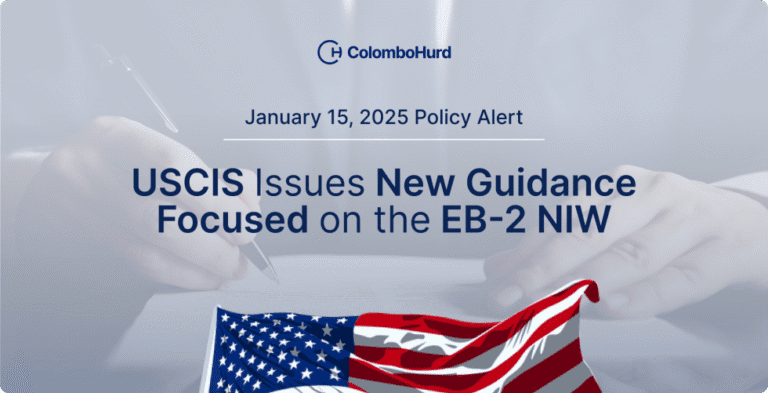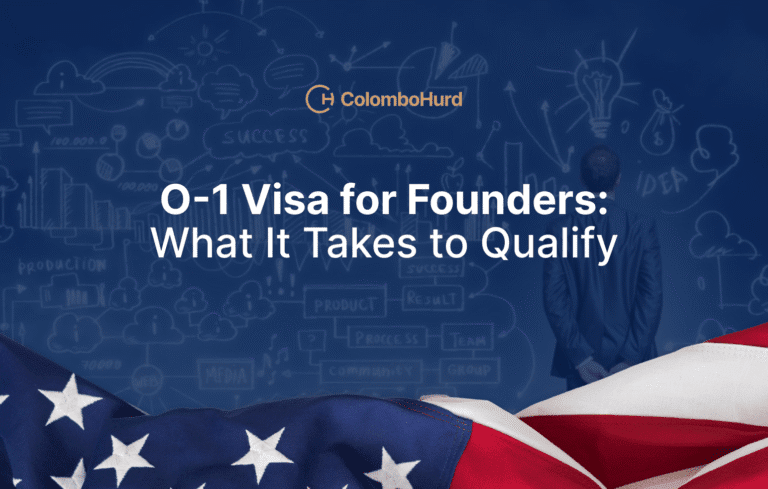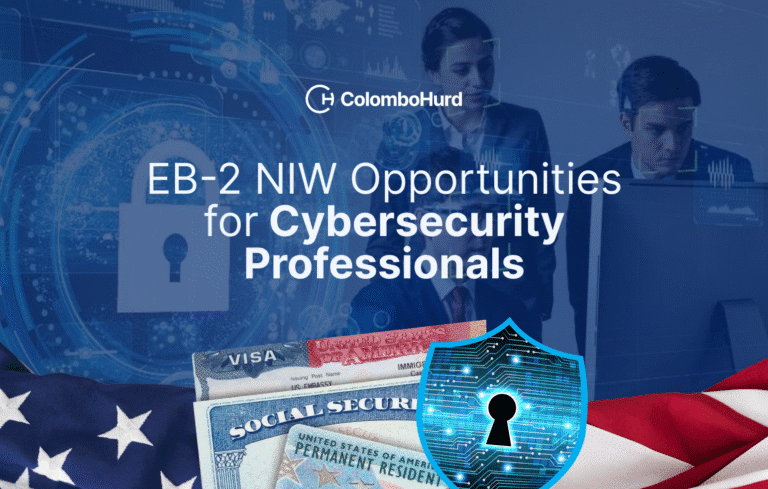On January 15, 2025, U.S. Citizenship and Immigration Services (USCIS) issued new policy guidance pertaining to eligibility criteria for second preference classification for National Interest Waiver (EB-2 NIW) petitions. For both immigration professionals and applicants, the guidance can help us more effectively demonstrate eligibility and align qualifications with U.S. national interests under the EB-2 NIW. We find that the update, as a whole, provides clearer guidelines for officers on how to fairly and consistently adjudicate petitions, while providing us with valuable insight into the complex considerations that officers should take when adjudicating NIW petitions.
Key Updates from the USCIS Policy Alert
Qualification for EB-2 Classification
To qualify for a National Interest Waiver, you first need to qualify for the underlying EB-2 classification as an advanced degree professional or as a person of exceptional ability.
As background on how to qualify for EB-2: An “advanced degree” is any U.S. or foreign academic degree higher than a bachelor’s degree, or a bachelor’s degree plus at least five years of progressive work experience in the same field, while “exceptional ability” means having an above-average level of expertise in the sciences, arts, or business, or substantially benefiting the U.S. economy, culture, or welfare.
The new policy guidance highlights the importance of demonstrating foundational eligibility for the EB-2 category, which is a prerequisite for qualifying for a National Interest Waiver. More than in the past, the USCIS has helpfully further clarified how they evaluate “advanced degree” and “exceptional ability” when it comes to EB-2, and we will explain these changes in the following two sections. More than in the past, the USCIS has helpfully further clarified how they evaluate “advanced degree” and “exceptional ability” when it comes to EB-2, and we will explain these changes in the following two sections.
Connecting Occupation and Experience for Advanced Degree Professionals
For EB-2 advanced degree classification, USCIS takes a case-by-case approach when deciding if your occupation qualifies as a profession and if your post-degree experience is directly relevant to the proposed endeavor.
To meet these qualifications, you need to show that your intended occupation requires at least a bachelor’s degree and that it fits USCIS’s definition of a “profession,” and that your experience is in the specialty.
With this policy update, USCIS is confirming that your educational background and work experience must be closely related to the proposed work in the U.S. The connection between your occupation and your proposed endeavor must be apparent, especially without a labor certification that outlines job requirements.
This means the burden of proof lies with you, the applicant, to provide sufficient evidence that your occupation is a profession and that your experience is directly related to the endeavor. We can work with you to present the best possible evidence, which could include academic credentials, detailed work history, job descriptions, and letters from employers, that clearly outline the connection between your qualifications and your proposed work.
Because USCIS reviews each petition individually, it is important to present a well-documented case that ties education, experience, and proposed work together in a compelling way.
Relationship Between Exceptional Ability and Proposed Endeavor
For EB-2 exceptional ability classification, USCIS again takes a case-by-case approach in evaluating the relationship between exceptional ability and proposed endeavor, with a focus on how your skills, knowledge, and expertise will advance your proposed work in the U.S.
In our view, this added language from USCIS emphasizes that your exceptional ability should directly align with the work you intend to pursue in the U.S. and that the field of exceptional ability must be the same or very similar to the field of the proposed endeavor.
To present a strong case, our strategies focus on demonstrating how your exceptional abilities are essential to the success of your proposed endeavor and to U.S. national interests. This could include showing how your exceptional abilities will address critical challenges, advance innovation, or support key industries in the U.S.
By providing a clear link between your qualifications and your proposed work, we can effectively show that your exceptional ability is necessary for the success of your endeavor and beneficial to the U.S. national interest.
Understanding the Evaluation of National Importance
The Policy Guidance provides important clarification on how USCIS determines if a proposed endeavor has national importance, an essential element for NIWs. Your proposed endeavor must be aligned with elements that are of national importance to the U.S., including, but not limited to, strategic priorities, economic needs, or cultural and societal interests.
While USCIS evaluates each case individually, certain types of projects are more likely to be deemed of national importance. For example, we have found that endeavors addressing critical issues that impact the full field of endeavor, a region, or the country are typically prioritized.
USCIS requires evidence that directly connects the benefits of your proposed endeavor to the U.S. national interest. The proposed endeavor itself—rather than just the field or issue —must be of national significance. To this end, we will focus on highlighting how the endeavor contributes to national priorities and objectives, not just focusing on the importance of the field or the critical issue to be solved.
The Policy Guidance provides more direction in proving national importance, but it also emphasizes what does not, such as vague assertions of general economic benefit or job creation without concrete supporting evidence. Your evidence should demonstrate a clear and tangible impact that directly addresses national needs.
Determining Your Position to Advance the Endeavor
In reviewing this update, we see a focus on the importance of specific, independent evidence to complement letters of support, business plans, and other documents demonstrating that you are well-positioned to advance your proposed endeavor.
Although USCIS does not specify all types of independent evidence they will consider, we understand that supporting materials may include financial evidence, letters of interest from stakeholders, contracts, articles of incorporation, or other documents that corroborate the claims made in business plans or letters of support. Overall, USCIS is prioritizing solid, substantive evidence over general endorsements.
Here again, USCIS stresses that each petition is reviewed on a case-by-case basis, and the more important you are to the success of the endeavor, the clearer it is that you are well-positioned to advance the proposed work. That’s why it’s crucial to show that your unique skills and experience make you the perfect fit for driving the proposed endeavor and contributing to its success.
On another note, the Policy Guidance includes new language for the third prong of Dhanasar, confirming that you can pursue an EB-2 NIW even if you are eligible for an employer-sponsored EB-2. Being able to be sponsored for a green card by an employer, or even already being sponsored, does not rule out the option of applying for the NIW. While this has always been the case, the recent updates make clear that you can choose the EB-2 NIW route even if other sponsorship options are available, offering more flexibility for those already working in the U.S.
Considerations for Entrepreneurial Applicants
USCIS has stressed that not every entrepreneur qualifies for a National Interest Waiver. For example, in our experience, the agency has a history of rejecting cases involving independent ventures such as consulting firms or self-employment. When evaluating entrepreneurs, USCIS emphasizes that their work must be directly tied to a significant national interest.
With this update, we find that the USCIS has included several examples of suggested evidence for those interested in entrepreneurial endeavors, but clarifies that no single piece of evidence automatically guarantees approval. If you are interested in an entrepreneurial endeavor, you should clearly demonstrate how your entrepreneurial work aligns with U.S. national interests and is poised to benefit the economy in a significant way.
The Importance of Comprehensive Evidence in All Cases
USCIS includes a key reminder in this policy update: they will review all evidence in the aggregate, not piece-by-piece. The update reinforces the importance of presenting a well-rounded case that showcases your qualifications in the best light.
The comprehensive evidence supporting your application should highlight key elements such as education, experience, skills, and the broader benefit of your proposed endeavor to U.S. national interests.
We recommend that you avoid relying on one piece of evidence or one aspect of your qualifications to establish eligibility. Instead, strive to present a variety of evidence demonstrating how your work will advance U.S. priorities and bring tangible benefits to the country’s economy, culture, or welfare.
Conclusion
Based on our analysis, we find that the overarching theme of this USCIS Policy Manual update is greater clarity, expanded examples, and an emphasis on national priorities.
A key focus of the update is the need to explicitly link the field of expertise to recognized U.S. national priorities. The new guidance is especially important for entrepreneurs and professionals in specialized fields, who can benefit from these clarifications to make their cases more convincing. Tying your experience directly to your proposed endeavor is essential, and if there are any uncertainties, we invite you to schedule a consultation with our team.
Lastly, it’s important to note that the Trump Administration can relatively easily amend or rescind these updates, since the policy is not formal rulemaking. If this occurs, USCIS would typically issue a new Policy Alert or memorandum to announce that the guidance has been changed, potentially justifying the change by aligning it with new administrative priorities. However, such changes could also lead to legal challenges, especially if the public or employers have already relied heavily on the new guidance.
Despite this possibility, and regardless of further updates, we are here to explain the nuances of new policies and to help you stay informed and adjust your NIW application strategy accordingly.





